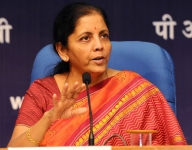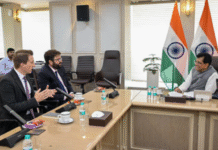New Delhi–With the lack of a Totalisation Agreement continuing to hamper movement of Indian professionals and experts to the US, India on Thursday reiterated its call to the US to engage in negotiations for signing such a pact.
“We very clearly identified this as one of the non-tariff measures restricting the movement of IT professionals. We have strongly urged the US to engage in negotiations for signing of a Totalisation Agreement (Social Security agreement),” Commerce Minister Nirmala Sitharaman told reporters here.

She said this after a delegation-level meeting with US Trade Representative Michael Froman as part of the 10th India-US Trade Policy Forum.
“It is being heard and I hope there will be a positive response from their side,” she said.
“The two countries acknowledged the ongoing discussions on totalisation and resolved to continue their engagement on the elements required in both countries in order to pursue a bilateral Totalisation Agreement,” a joint statement after the meeting here said.
A Totalisation Agreement, which allows avoidance of double taxation, permits professionals of both the countries to be exempted from social security taxes when they go to work for a short period in the other country.
On the issue of Intellectual Property Rights (IPR), which has been a major bone of contention between the two countries, Sitharaman said a lot of efforts were being made to dispel the misconceptions of the US delegation about the Indian patent regime.
“Both countries emphasised the role of robust and balanced IPR protection in fostering creativity, promoting innovation, and attracting investment, taking into account the interests of all stakeholders, including the public,” the statement said.
Regarding compulsory licencing (CL), which the US feels should only be used in the rarest of circumstances and not as a matter of course, Sitharaman said India reminded the American delegation that so far it has issued only one CL and after following a due process.
A CL is used in case of a public health emergency to make available an expensive patented drug.
Sithraman said the Indian side raised matters related to greater market access for agricultural goods like grapes and mangoes and pharmaceutical products.
“We find that in the US administration new laws are brought up and new rules are made and they have different impact on our trading, particularly I am referring to in the case of food and drugs,” the Union Minister said.
On the question on investments, the joint statement said: “Both sides agreed that creating a transparent, predictable and open business environment that reduces administrative burden and protects innovation is essential for attracting investment, promoting manufacturing activity.”
TPF is the bilateral forum for discussion and resolution of trade and investment issues between the two countries. It has five focus groups: agriculture, investment, innovation and creativity (intellectual property rights), services, and tariff and non-tariff barriers.
Delivering a talk here later on Thursday, Froman said that certain areas in the Indian economy like retail and financial services needed further opening up.
“There needs to be continued work on improving the business environment if India is going to attract the kind of investment – domestic and foreign – to meet its aspirations,” Froman said while delivering a talk on Indo-US trade relations at the University of Chicago Centre.
“Liberalising the retail, financial services and professional services sectors would help create an open, non-discriminatory and predictable regime that enhances the development of those markets,” he said.
India-US bilateral trade was worth $109 billion in 2015-16. (IANS)







